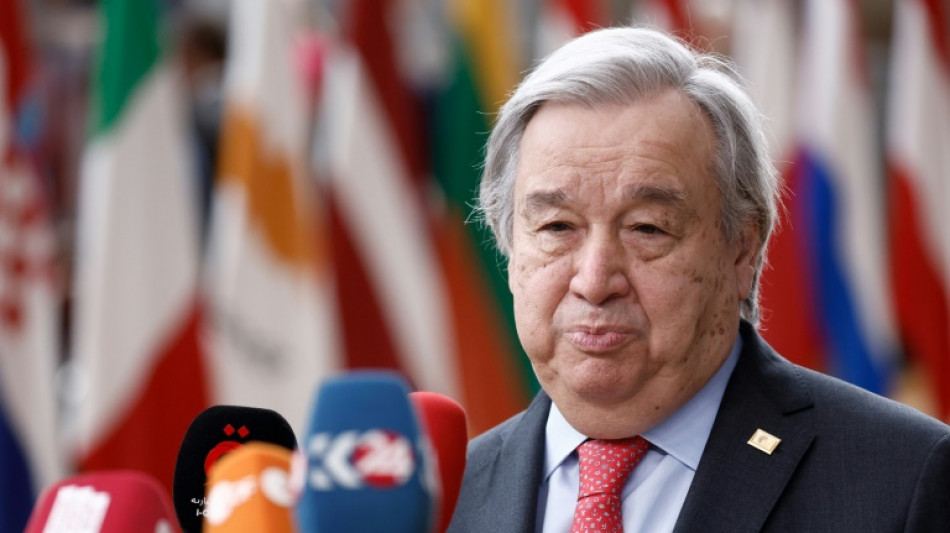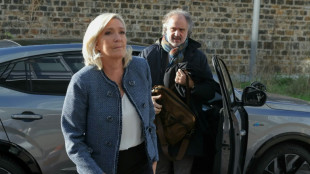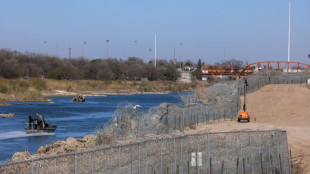
-
 Mbappe can be Real Madrid 'legend' like Ronaldo: Ancelotti
Mbappe can be Real Madrid 'legend' like Ronaldo: Ancelotti
-
Saka 'ready to go' for Arsenal after long injury lay-off: Arteta

-
 Aston Martin to sell stake in Formula One team
Aston Martin to sell stake in Formula One team
-
Three talking points ahead of clay-court season

-
 French court hands Le Pen five-year election ban
French court hands Le Pen five-year election ban
-
Probe accuses ex J-pop star Nakai of sexual assault

-
 Japan leads hefty global stock market losses on tariff woes
Japan leads hefty global stock market losses on tariff woes
-
Saka 'ready to go' after long injury lay-off: Arteta

-
 Ingebrigtsen Sr, on trial for abusing Olympic champion, says he was 'overly protective'
Ingebrigtsen Sr, on trial for abusing Olympic champion, says he was 'overly protective'
-
Tourists and locals enjoy 'ephemeral' Tokyo cherry blossoms

-
 Khamenei warns of 'strong' response if Iran attacked
Khamenei warns of 'strong' response if Iran attacked
-
France fines Apple 150 million euros over privacy feature

-
 UK PM urges nations to smash migrant smuggling gangs 'once and for all'
UK PM urges nations to smash migrant smuggling gangs 'once and for all'
-
Thai authorities probe collapse at quake-hit construction site

-
 France's Le Pen convicted in fake jobs trial
France's Le Pen convicted in fake jobs trial
-
Chinese tech giant Huawei says profits fell 28% last year

-
 Trump says confident of TikTok deal before deadline
Trump says confident of TikTok deal before deadline
-
Myanmar declares week of mourning as hopes fade for quake survivors

-
 Japan's Nikkei leads hefty market losses, gold hits record
Japan's Nikkei leads hefty market losses, gold hits record
-
Tears in Taiwan for relatives hit by Myanmar quake

-
 Venezuela says US revoked transnational oil, gas company licenses
Venezuela says US revoked transnational oil, gas company licenses
-
'Devastated': Relatives await news from Bangkok building collapse

-
 Arsenal, Tottenham to play pre-season North London derby in Hong Kong
Arsenal, Tottenham to play pre-season North London derby in Hong Kong
-
Japan's Nikkei leads hefty equity market losses; gold hits record

-
 Israel's Netanyahu picks new security chief, defying legal challenge
Israel's Netanyahu picks new security chief, defying legal challenge
-
Trump says US tariffs to hit 'all countries'

-
 Prayers and tears for Eid in quake-hit Mandalay
Prayers and tears for Eid in quake-hit Mandalay
-
After flops, movie industry targets fresh start at CinemaCon

-
 Tsunoda targets podium finish in Japan after 'unreal' Red Bull move
Tsunoda targets podium finish in Japan after 'unreal' Red Bull move
-
French chefs await new Michelin guide

-
 UK imposes travel permit on Europeans from Wednesday
UK imposes travel permit on Europeans from Wednesday
-
At his academy, Romanian legend Hagi shapes future champions

-
 Referee's lunch break saved Miami winner Mensik from early exit
Referee's lunch break saved Miami winner Mensik from early exit
-
Djokovic refuses to discuss eye ailment after shock Miami loss

-
 Mitchell magic as Cavs bag 60th win, Pistons and T'Wolves brawl
Mitchell magic as Cavs bag 60th win, Pistons and T'Wolves brawl
-
Mensik shocks Djokovic to win Miami Open

-
 Duterte lawyer: 'compelling' grounds to throw case out
Duterte lawyer: 'compelling' grounds to throw case out
-
What happens on Trump's 'Liberation Day' and beyond?

-
 Clock ticks on Trump's reciprocal tariffs as countries seek reprieve
Clock ticks on Trump's reciprocal tariffs as countries seek reprieve
-
Japan-Australia flagship hydrogen project stumbles

-
 Musk deploys wealth in bid to swing Wisconsin court vote
Musk deploys wealth in bid to swing Wisconsin court vote
-
Mensik upsets Djokovic to win Miami Open

-
 China manufacturing activity grows at highest rate in a year
China manufacturing activity grows at highest rate in a year
-
'Waited for death': Ex-detainees recount horrors of Sudan's RSF prisons

-
 Japan's Nikkei leads big losses in Asian markets as gold hits record
Japan's Nikkei leads big losses in Asian markets as gold hits record
-
Rescue hopes fading three days after deadly Myanmar quake

-
 'Basketbrawl' as seven ejected in Pistons-Wolves clash
'Basketbrawl' as seven ejected in Pistons-Wolves clash
-
Four men loom large in Microsoft history

-
 Computer pioneer Microsoft turns 50 in the age of AI
Computer pioneer Microsoft turns 50 in the age of AI
-
Trump calls out both Putin and Zelensky over ceasefire talks


Humanity must chart new course on water use: UN chief
UN Secretary-General Antonio Guterres on Friday delivered an urgent call for the world to modify and safeguard water resources to avert conflict and ensure future global prosperity.
Water is "the most precious common good," and "needs to be at the center of the global political agenda," Guterres said at the end of a three-day UN conference that experts said held a measure of promise.
"All of humanity's hopes for the future depend, in some way, on charting a new science-based course to bring the water action agenda to life," Guterres said.
"Now is the time to act."
The world is not on track to meet its 2030 water goals, including access to safe drinking water and sanitation for all.
Guterres earlier in the week described water as humanity's "lifeblood" and said its "vampiric overconsumption" had "broken the water cycle" and led to more natural disasters.
NGOs, governments and the private sector offered nearly 700 commitments before and during the three days of the UN gathering that drew some 10,000 participants. Pledges ranged from the construction of toilets to the restoration of 300,000 kilometers (186,400 miles) of degraded rivers and massive areas of wetlands.
Less than a third of the commitments have funding said Charles Iceland of the World Resources Institute think tank, adding that about a third "are going to have substantial impact."
Despite this, "these voluntary commitments are a good start," he told AFP, referring in particular to a project led by Germany on the management of the Niger River basin which touches nine nations in Africa.
- 'Pleasantly surprised' -
"It's probably the part of the world that is the most fragile, and where we're starting to see actual violent conflict over water between different groups," he said.
But at the global level, the issue of water "is a huge problem and one conference is not going to do it," Iceland added, pleading for annual conferences on water.
"You hear a lot of pledges," Stuart Orr of WWF told AFP. "But this feels somehow quite different."
While it "is not all rosy," Orr added, "a lot of the commitments that have been made this week are very good."
He said he was "pleasantly surprised," in part, at the variety of institutions and organizations now talking about water.
"This issue is not going away. The water issue is only going to get worse. And I think that's why everybody is starting to feel maybe now really is the time to get going," Orr said.
The conference pleaded for Guterres to appoint a UN special envoy for water, which the secretary-general says is under consideration.
Without a dedicated UN agency or global treaty, "water has no home here at the UN," said Henk Ovink, water envoy of the Netherlands, which was a coorganizer of the conference.
In 2020, two billion people were still without safe drinking water and 3.6 billion lacked access to safely managed sanitation services, including 494 million who had to relieve themselves in the open, according to the latest figures compiled by the UN-Water website.
At least two billion people drink water contaminated with feces, and 2.3 billion lack basic sanitation services -- conditions conducive to the spread of cholera, dysentery and polio.
While climate change makes droughts more frequent and intense, UN climate experts (IPCC) also estimate that about half of the world's population suffers from "severe" water shortages during at least part of the year.
A young Dutch woman, Aniek Moonen, addressed the conference as if she were speaking from the year 2050.
She suggested that the summit could be a pivotal moment for water management "to become more sustainable, equitable and just than ever before."
"This is the future speaking. Don't forget to listen," she told the delegates.
P.Santos--AMWN



